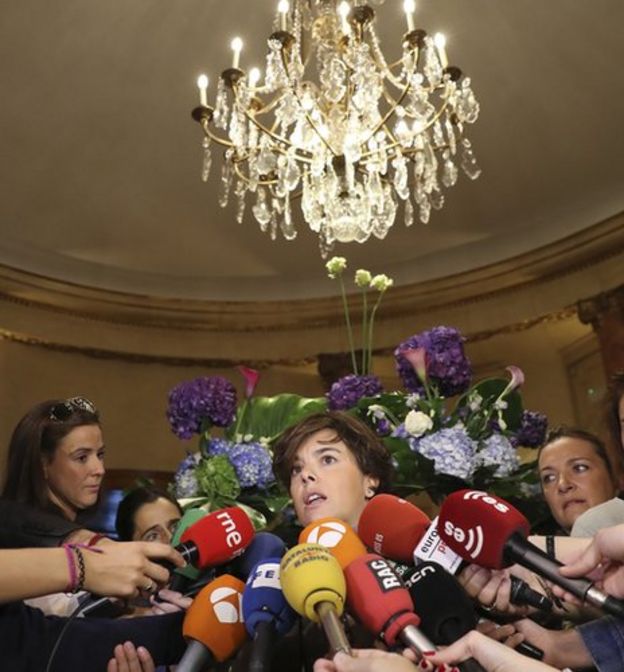Soraya Sáenz de Santamaría - Madrid's enforcer for Catalonia

The woman appointed by Madrid to restore Spanish rule in Catalonia is seen as a capable politician but one lacking in charisma.
In those respects, María Soraya Sáenz de Santamaría Antón, 46, mirrors to some extent Prime Minister Mariano Rajoy, whom she has served as deputy prime minister since he took office in December 2011.
Before entering politics, she was a state lawyer, a member of an elite legal corps serving the state apparatus, and is more than qualified to use the letter of the law against the separatists.
Untainted by the corruption scandals which have gripped Mr Rajoy's centre-right Popular Party (PP), her credentials are impeccable in the eyes of the government.
But she will be regarded as an implacable foe by the Catalan nationalist politicians being sacked to make way for direct rule.
'Extraordinary job'
Ms Sáenz de Santamaría was born an only child on 10 June 1971 in the north-western city of Valladolid, the medieval seat of the monarchs of Castile.
After studying law at the city's university, she passed a tough public contest to become a state lawyer at the age of 27.
 REUTERS
REUTERS
She was first elected as an MP at the 2004 general election which saw the PP crash out of power over its mishandling of the Madrid terror attack.
She became the government spokeswoman in parliament when the party finally returned to power under Mr Rajoy in 2011, on the promise of restoring the economy after the 2008 global banking crisis.
The year 2011 was significant in her personal life too, when she gave birth to her first and only child, a son, just weeks before the election.
The fact she had returned to work within 11 days of becoming a mother raised some eyebrows, the UK's Daily Telegraph reported at the time, but was defended by others.
"If Soraya had stayed at home for four months it would have been irresponsible," Nuria Chinchilla, a professor at the IESE business school, was quoted as saying.
"We are suffering extraordinary times in Spain and [she has] an extraordinary job to do."
Regional specialist
As deputy prime minister, she was briefly acting minister of justice and minister of health. More importantly, she has been minister of territorial administrations since November 2016.
In that post, she has been responsible for the national government's relations with Catalonia and the other autonomous regions.
 EPA
EPA
"She has been very present in Catalonia during the last year as some kind of 'special envoy' so we can expect she knows both the terrain and the actors," Manuel Arias-Maldonado, political science professor at Málaga University, told BBC News.
On the day before the government imposed direct rule, she declared in an uncompromising speech about Catalonia: "We have to rescue it."
"The independence leaders have shown their true face - they have promised a dream but are performing tricks," she told a Spanish Senate hearing.
Now she has the Herculean task of persuading the estimated two million Catalans who voted for independence on 1 October that they were misguided.
Is she up to it?
'Not beloved'
She is clearly Mr Rajoy's preferred crisis manager, deployed to handle such diverse challenges as an Ebola episode in 2014 and the Germanwings plane crash in 2015, a recent Reuters profile notes.
While she was "not the world's most electrifying political speaker", she came over as "the most popular minister in an unpopular government", the American paper noted.
"Views on her are unavoidably polarised," says Arias-Maldonado.
"As a woman from the centre-right, she is not much praised by feminist lefties despite her feminist merits but generally she is seen as capable, although some see her as ultimately ineffective.
"Overall, though, I would say she retains the image of a capable female politician."
According to a Huffington Post listicle on Ms Sáenz de Santamaría from 2015, which reveals her as a fan of Amy Winehouse and Coldplay among other things, she possesses a collection of gloves.
As she embarks on the biggest test of her political career to date, one assumes that whatever gloves she chooses for Barcelona, they may come off very quickly.
Comments
Post a Comment